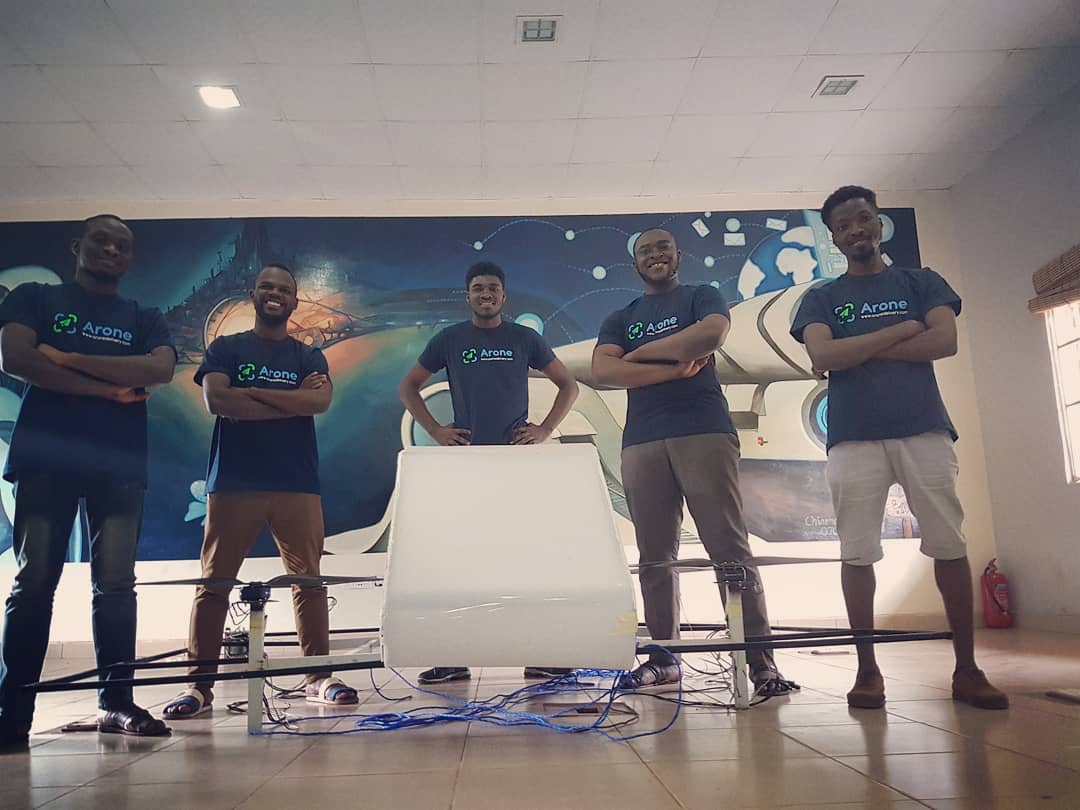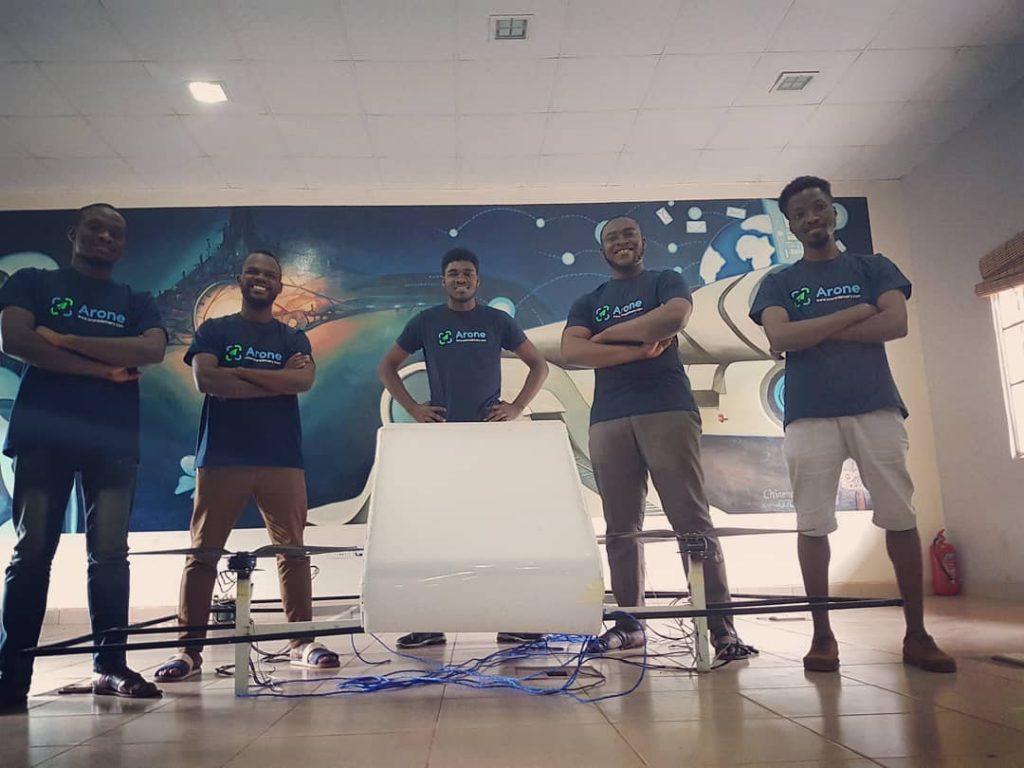As we celebrate our independence day, we decided to showcase talents that are building the strengths of the nation. We know the nation is imperfect but rather than talk about the imperfect nature of the nation, we have decided to celebrate people who are investing their time, energy and talents in portraying Nigeria to the world. This interview was taken from Thisisafrica.me website but we find it encouraging to showcase it here that Young Nigerians are doing amazing things.
A startup in Nigeria is set to revolutionise drug delivery in Africa with the use of drones to reach local clinics and hospitals that urgently need the medication. This innovative use of drones to deliver medical supplies is a first in Nigeria.
Arone is an example of a technology made in Africa for Africans by Africans, writes Patrick Egwu.

Last year, a young Nigerian, inspired by Life Bank, a startup that delivers blood to hospitals that urgently need supplies, decided to set up his own startup, which he called Arone. It is a drone delivery company and it is building the future of personalised drone delivery systems in Africa.
“I visited Lagos and experienced the traffic. During that time, I had the opportunity to meet the founder of Life Bank – and that was when the whole idea came about,” said Emmanuel Ezenwere, founder of Arone. “Life Bank is a startup that delivers blood. They find blood banks that have blood and they connect this blood to clinics where supplies are needed urgently. I started thinking about the impact it would have if we were able to assist them by using drones to deliver blood much quicker to people that need it so desperately. So that was when the idea came.”
Ezenwere, an artificial and intelligence engineer who designs and builds software for autonomous flight at Arone, said feedback he got from people also encouraged him to start working on and developing the idea after his visit to Lagos.
“I kept getting hints and feedback from people that I should really look into this, so I felt convinced that I should do this,” he said.
Arone is made up of six team members who are working towards achieving the goals of their startup: saving lives in Africa, especially in rural communities that do not have access to medical supplies. In addition to Ezenwere, the team members of Arone are Charles Njoku, who is the designer and head of design labs at Arone, responsible for graphic design, logos and branding; Kenechukwu Ezeama, an electronics engineer who designs and builds flight aviomics; John Chamberlain Agbo, a mechanical engineer who develops CAD models and simulations; Emmanuel Ikpe, an automation engineer in charge of robotics; and Valentine Ofoegbu, a mobile developer who develops Arone mobile app that enables hospitals to make requests for medical supplies.
On how he selected his team, whom he describes as “incredible,” Ezenwere said, “We are six guys with backgrounds in engineering, software development and design. So when I returned to school, I have friends there that I have worked with on various projects in the past: We built a rocket in my first year and a wind turbine in my second year. So I knew the best people for this. I called them and told them about this idea. They were as excited as I was and that was how we really started.”
“I see Arone as a business that will be saving lives.”
Using high-tech devices, Arone solves major problems encountered daily with the traditional delivery system in Africa by providing fast, secure, eco-friendly and cost-effective delivery with emergency health supplies, e-commerce and food delivery as the target market.
Every year, 1,6 million Africans die from diseases that could have been cured or handled if treated early with drugs.
“In Africa, medical delivery is a big problem,” Ezenwere said. “Every year, 1,6 million Africans die from preventable causes. These include diseases such as malaria and tuberculosis – diseases that could have been cured or handled if treated early with drugs. Most of the clinics in the rural communities lack access to these vital medical supplies due to poor road networks and poor logistics and infrastructure, he said, “To use Nigeria as a reference point, the country has about 30 000 primary health care centres and just 6 000 of these are functioning, with others lacking access to medicine and supplies such as blood.”
The goal of Arone, according to Ezenwere, is to solve these problems by closing the gap between rural communities and clinics and urban health care centres by providing adequate supplies of medical products such as units of blood and medicine in order to save lives.
Emerging winners at 2018 Slush GIA
A few months ago, Arone emerged as the winners at the Slush Global Impact Accelerator (GIA) regional programme at the Heartland Incubation Hub in Owerri, South East Nigeria. With the award under their belt, the team will be representing Nigeria at the GIA finals in Helsinki, Finland, in December.
The purpose of the GIA is to support impact startups and showcase the exciting business opportunities in emerging markets, which are also vital for implementing the Agenda 2030 and solving complex challenges.
In addition, the programme focuses on strengthening the networks between the impact actors, engaging the Nordic community with the global impact entrepreneurs, and enhancing the mobilisation of capital towards impactful business.
“What we had was a local boot camp accelerator at Heartland Incubation Hub in Owerri that culminated in a pitch,” Ezenwere said of the regional finals. “We had a boot camp session with several investors where we learnt how to build startups and various aspects of building a business and customer communication and lots of other aspects of building a successful startup. After the boot camp, we had a pitch where 10 startups pitched to judges. We emerged as the winners.”
He continued: “We were very excited, not just me but my whole team. I remember calling my team mates a few minutes after the results were announced and we were all very excited. I also felt very privileged because there were a lot of amazing ideas and we were selected as first winners.”
For team member Charles Njoku, winning the regional finals means a lot. He adds that Arone has done so much for him and he hopes to achieve more with the team. “If I look at where I was and where I am now, there is big improvement. Learning new things, trying to understand stuff and looking at society in a broader way become the driving factor for creating solutions to problems and building the type of technology that makes a difference. It has opened me up to a better understanding of how to provide solutions to problems,” he said.
Similarly, on 25 September 2018, Arone was selected for the 38th GITEX Technology Week, which will take place in Dubai from 14 to 17 October. GITEX is the fastest-growing startup event in the Middle East and North Africa (MENA) region and South Asia. Over 850 startups from 75 countries and across 19 sectors will showcase their innovations and compete for top honours in the Supernova Challenge and four industry-sponsored Innovation Cups.
Future goals
The startup, which is currently incubating at the Roar Nigeria Hub, hopes to reach more African countries in the coming years as a way of saving more lives by delivering medical supplies where they are urgently needed.
“It has been a great experience so far. We have lots of mentorship and exposure to investors and we have also pitched to several potential investors,” Ezenwere said of their time at the Roar hub. “We have also had resources such as internet connectivity and steady power supply – these are very valuable, given how big a problem a constant power supply is in the country.”
“Five years from now, Arone will be in other countries in Africa, because we plan to expand beyond Nigeria to countries such as Congo, Rwanda and beyond,” Ezenwere said. “So we expect to make a large number of life-saving deliveries each day. We really want to reduce the 1,6 million deaths from lack of access by providing timely access to adequate medical supplies. We believe we can get it down to zero.”
Similarly, other members of the Arone team share the same sentiments with Ezenwere.
“In the future, I see Arone as a business that will be saving lives, whereby you will be able to access supplies not only in Nigeria but all over Africa. We aim to bridge the gap for many hospitals that do not have easy access to blood delivery for patients, giving them the direct access to blood banks that they need,” said Kenechukwu Ezeama.
Njoku said one of the challenges of the startup is paucity of funds. This is synonymous with most startups, but he noted that was not stopping the group from achieving their goals. “The challenge with every Nigerian startup is funds. If you have the money, you can get the best equipment to work with and fast-track your projects. But the lack of funds is not stopping us.”
However, Arone is currently attracting funders. In March, Arone received US$5 000, its first venture funding, from three angel investors. A large percentage of this funding has been invested in obtaining the inventory and equipment for building Arone drones. This includes a 3D printer for rapid prototyping. While anticipating more grants and financial support, Ezenwere and his team are hopeful that the finals will afford them the opportunity to meet up and partner with potential investors and stakeholders.
“We are excited to be representing Nigeria and we are going to make Nigeria proud. We also expect to meet investors who will be as excited as our current investors and team mates are. We hope to also forge valuable partnerships with organisations such as UNICEF and Red Cross, who are very enthusiastic about using drones to bridge the gap between rural health care and urban health care centres. So, we expect partnerships and investment,” he said.

